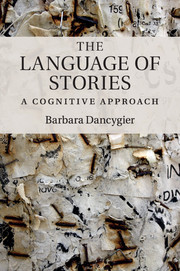Book contents
- Frontmatter
- Contents
- Figures
- Acknowledgements
- Introduction
- 1 Language and literary narratives
- 2 Blending, narrative spaces, and the emergent story
- 3 Stories and their tellers
- 4 Viewpoint
- 5 Referential expressions and narrative spaces
- 6 Fictional minds and embodiment in drama and fiction
- 7 Speech and thought in the narrative
- 8 Stories in the mind
- Notes to the text
- References
- Literary works cited
- Index
Introduction
Published online by Cambridge University Press: 05 November 2011
- Frontmatter
- Contents
- Figures
- Acknowledgements
- Introduction
- 1 Language and literary narratives
- 2 Blending, narrative spaces, and the emergent story
- 3 Stories and their tellers
- 4 Viewpoint
- 5 Referential expressions and narrative spaces
- 6 Fictional minds and embodiment in drama and fiction
- 7 Speech and thought in the narrative
- 8 Stories in the mind
- Notes to the text
- References
- Literary works cited
- Index
Summary
The relationship between language and literature is a contentious issue. On the one hand, it may simply be described as a relationship between raw material and a finished product – language provides the basis on which creative and unique works of literature emerge. On the other hand, once we look at meaning, the dividing lines begin to fade – it is difficult to define a sharp boundary separating the meaning of literary works and the meaning of other texts. One way of downplaying the obvious links is to claim that fiction engages knowledge in a much broader and much more culturally specific way than everyday use of language does. But that would be an exaggeration. One could not follow an ordinary discussion of, say, climate change if one did not have any prior knowledge of the issue. Terms such as global warming or carbon neutral mean something only in the context of the debate and the science underlying it. It is also not true that literature is different simply because it is not intended to describe facts which have actually occurred. Linguistic constructions such as conditionals do that too – they set up imaginary scenarios and explore their consequences. The dividing line is either too fine to see, or shifts too much, depending on the assumptions.
In this book I attempt not to debate those differences, but instead to talk about literary texts as linguistic artifacts, focusing on the description of language processes which participate in the emergence of literary meaning. My point of departure is the belief that if a text means something to someone, there have to be linguistic phenomena that make that possible. I found much inspiration and help in two cognitive theories of language: construction grammar, with its interest in the interaction between lexis and grammar and its trust in the meaningfulness of syntactic choices, and conceptual integration, with its focus on the mechanism of the emergence of meaning, regardless of the means that lead to the initiation of the process.
- Type
- Chapter
- Information
- The Language of StoriesA Cognitive Approach, pp. 1 - 3Publisher: Cambridge University PressPrint publication year: 2011

